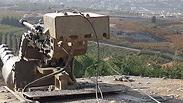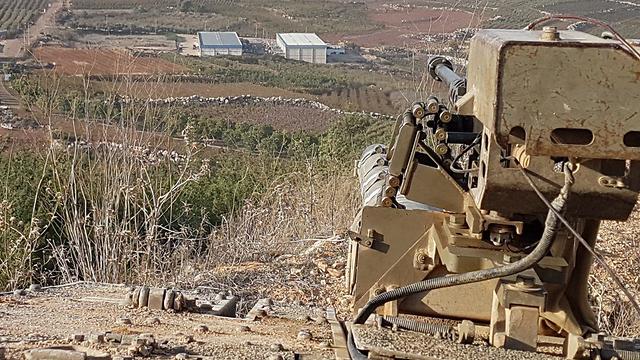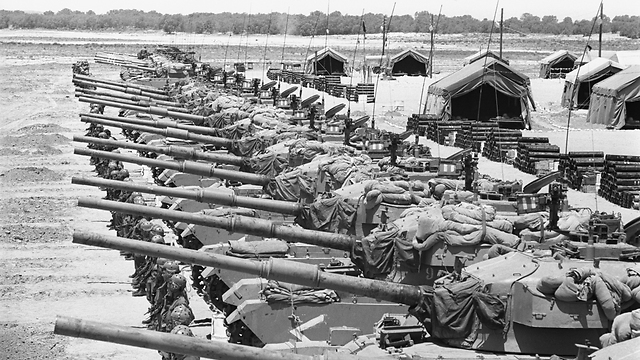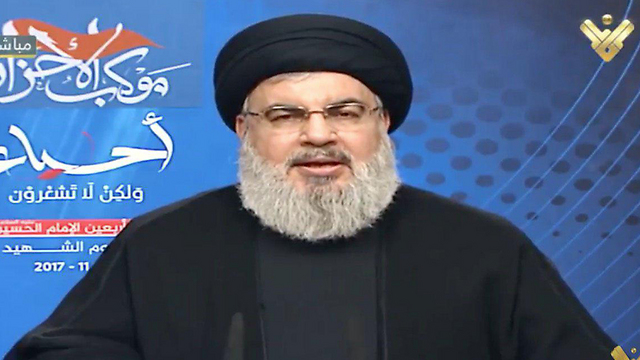
In next war with Hezbollah, Israel should look to 1967
Op-ed: While both the Jewish state and the Shi'ite terror organization have declared themselves disinterested in war at this time, in reality the next war will come too soon. When it does, Israel will do well to remember the lessons of the Six-Day War and not just those of the Second Lebanon War.
Every year around springtime the chatter begins like clockwork: In the summer, experts claim, a war between Israel and Hezbollah will start anew. This year is no different, with the exception that Hezbollah’s entanglement in Syria is winding down, Iranian military assets are on Israel’s borders, and tensions, preparations and warnings are at an all-time high.
In other words, at least on paper, the timing for war is ripe. A lot has happened since the Second Lebanon War in 2006. While both parties have grown stronger and smarter, alliances have altered and the risks to both sides have grown.

Hezbollah today has an abundance of sophisticated weaponry from Iran, Syria, China and Russia. As is often pointed out in the media, the group has more rockets than nearly all NATO countries. It has cooperation and coordination with the (US-backed) Lebanese Armed Forces (LAF) as well as the Lebanese government. It has a government in Syria that owes it its very existence and which is awash with Iranian Revolutionary Guard “advisors” that sit close to Israel’s borders. It has UAVs and missiles capable of targeting cities, ships and aircraft alike. Add to that the years of experience Hezbollah has gained in fighting US-backed forces such as the Kurds as well as terrorist groups such as ISIS, and Israel has itself one seriously formidable foe.
Understanding the propaganda value, any future conflict will see Hezbollah attempt for the first time to take control of an Israeli town or village, even if temporarily. And it very well may succeed in doing so (temporarily). If it is able to choose the start of the war, it will send tens of thousands of both precise and crude rockets into the Jewish state in the first few days, striking at all major Israeli population centers.
It will also attempt to target strategic Israeli positions such as Ben-Gurion Airport (and Israeli-bound aircraft), oil and gas platforms on land and sea, power and water plants, the IDF’s military headquarters in the heart of Tel Aviv, chemical plants in Haifa, and Israel’s main nuclear site in Dimona—not to mention Israeli and Jewish locations abroad. It will also make use of tunnels, with which Hezbollah has decades of experience. Nearly all of Israel will be at risk. These actions, however, will have consequences.
In any future conflict, Israel will attempt to target Lebanese infrastructure and punish that state for supporting Hezbollah and allowing itself to be used as cover by Hezbollah and Iran. This will result in government, military, commercial and military infrastructure being destroyed on a scale not seen in Lebanon in quite some time (if ever).
The approximately 200 villages that intentionally double as Hezbollah’s military bases in South Lebanon will be heavily damaged. Parts of Syria will likely be targeted as well, potentially bringing Assad’s remaining Syrian forces into the fray, as Hezbollah and Iran have significant resources capable of targeting Israel in that country.
Israel will begin any new conflict with the open support of the Trump administration as well as the tacit support of most of the Sunni Arab world, who are eager to see the Iranian-backed Shi'ite crescent weaken and bleed. But it will also have its share of detractors. The United States is more politicized than ever before, which means more will come out against Israel precisely as a result of US President Donald Trump’s support for the Jewish state.
Knee-jerk critics of Israel in Europe and elsewhere can be counted on to undoubtedly condemn the Jewish State regardless of the validity of its fight. Hezbollah is banking on the international community (and media) to jump into the anti-Israel frenzy, willingly and intentionally sacrificing the Lebanese civilian population to do so.
Considering its enemy and their tactics, for Israel to be viewed as the victor—especially by its own domestic population—it will need to do more than it has in previous engagements both in Lebanon and Gaza. It will need not just military success, but the conquering of large swaths of Lebanese territory to create the perception of a clear psychological and strategic victory as well.
Unlike the Second Lebanon War, this means Israel must go as far north as possible while ensuring it can control the supply lines to sustain it. The IDF need not get bogged down trying to take the individual southern Lebanese villages rife with entrenched and prepared Hezbollah resistance. It must follow the blitzkrieg strategy that it employed so successfully in 1967.
Preemption is also key to success, and something not easy for any democratic state to employ. Israel will need to create a casus belli to commence a war; something that should not be difficult to find. Prime Minister Benjamin Netanyahu has been traditionally weary of war, but his current political troubles make him perhaps more amenable to fighting an inevitable conflict on Israel’s best terms.
Only preemption will ensure the Jewish state better controls the pace of the war from its onset, while also allowing its air force to destroy more precision guided and heavier munition rockets and missiles before they have a chance to launch. Thanks to the newest Trump administration shake up, between John Bolton and Michael Pompeo, Israel has perhaps its best allies in place for just such a strike.
Israel must also avoid creating unrealistic goals it cannot possibly guarantee, which only feeds into the narrative of its enemies. Claims to destroy Hezbollah “once and for all” sound great, but weaken the Israeli position when all is said and done, and both domestic and international pressures result in Israel calling it quits prior to reaching that incredibly difficult goal. And stating that Hassan Nasrallah and other leaders will be eliminated only matter if they actually take place. Better to remain quiet and take in the credit and praise only once something tangible is achieved.
While both Hezbollah and Israel have declared themselves disinterested in war at this time, in reality the next war will come too soon. When it does, Israel will do well to remember the lessons of 1967 and not just those of 2006.
Dr. Joshua Gleis is president of Gleis Security Consulting, author of “Withdrawing Under Fire: Lessons Learned from Islamist Insurgencies” and co-author of “Hezbollah and Hamas: A Comparative Case Study.”












